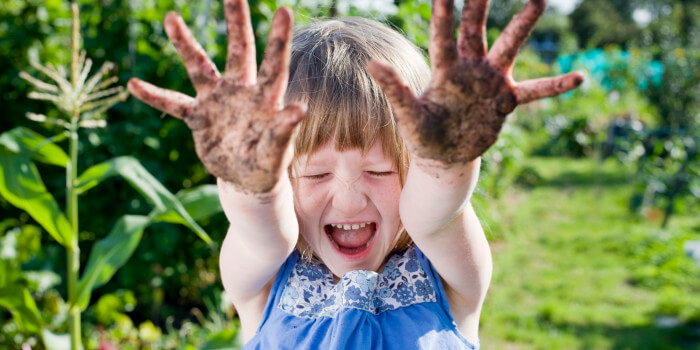 Gardening with kids can be fun and educational, but did you know that it’s also full of sensory benefits? Children learn about the world using their senses, and as they grow and develop, sensory experiences help children make connections. For the child with a visual or other sensory impairment, these kinds of learning experiences are essential.
Gardening with kids can be fun and educational, but did you know that it’s also full of sensory benefits? Children learn about the world using their senses, and as they grow and develop, sensory experiences help children make connections. For the child with a visual or other sensory impairment, these kinds of learning experiences are essential.
Before you head out with garden gloves and trowel in hand, however, there are a few things you should do indoors. Try reading a picture book with your child to pique their interest. Try Up, Down and Around by Katherine Ayres (CL 9758) or My Garden by Kevin Henkes (BR 19016), both of which are available from the Library in a dual print/Braille format. This will give your child a point of reference for the hands-on experiences they’ll have in the garden later. If your child is reluctant to spend time outdoors because it can be full of unexpected sensory input, as many children with sensory integration issues are, try bringing a few objects inside to explore and get comfortable with first. And of course, make sure that wherever you’re gardening is a safe place and that you have equipment and tools that are suitable for your child’s use. That’s it! All that’s left to do is head outside and dig in!
Try these hands-on activities in the garden to encourage sensory learning:
• Feel a variety of plants and plant parts
• Sort and plant seeds (this also encourages fine motor development)
• Scoop and pour dirt
• Create mud with dirt and water
• Harvest vegetables and fruit
• Pick flowers
The important thing is to let your child explore and interact with nature, so follow their lead, and fun and learning are sure to follow!
Don’t have a garden or have minimal outdoor space? No matter—you can garden indoors! Check out A Kid’s Guide to Making a Terrarium by Stephanie Bearce (DB 70024) for an explanation on how to plan, create, and maintain a miniature garden under glass in your own home! You could also go on a sensory nature scavenger hunt. WonderBaby.org, a project funded by Perkins School for the Blind, has an excellent article about adapting an outdoor scavenger hunt for kids with visual impairments. And for tips on gardening as an adult with a visual impairment, check out these resources provided by the Training and Educational Resources Program at Perkins School for the Blind.
Happy gardening!
